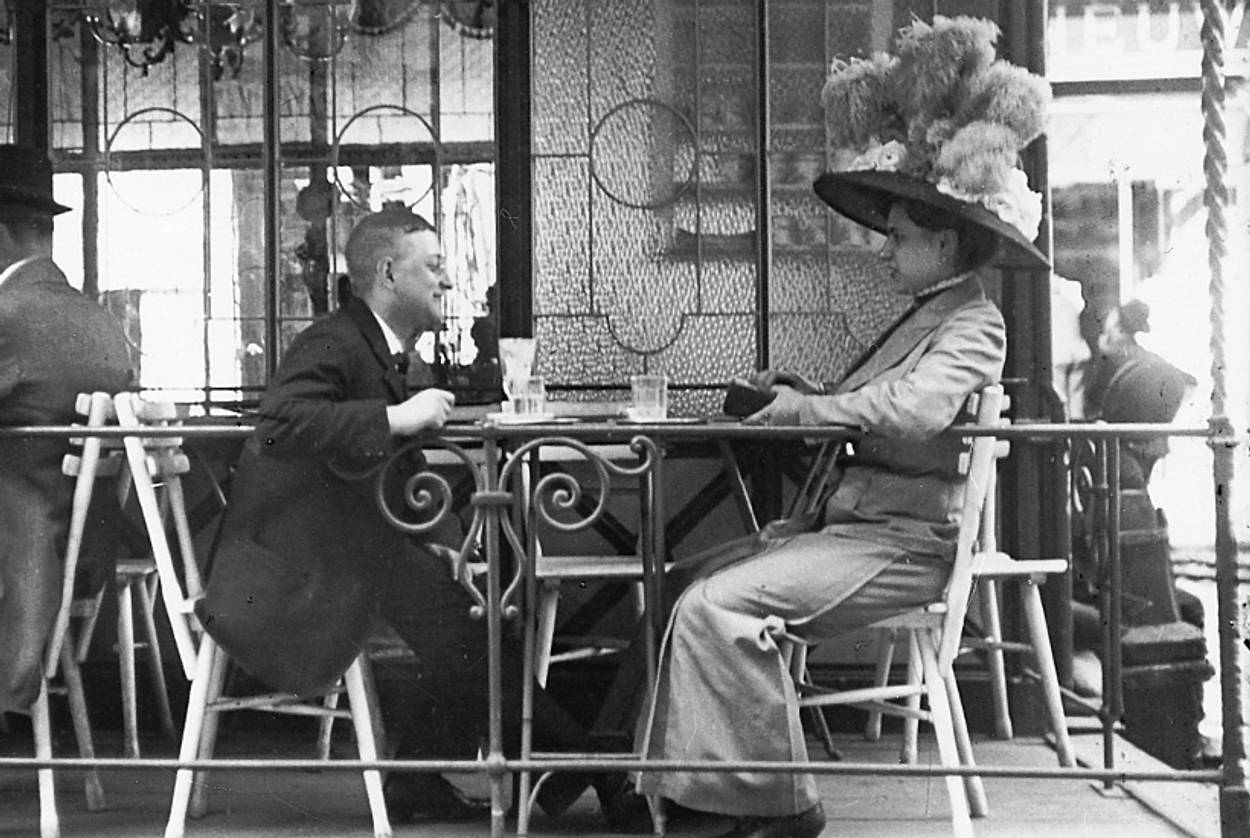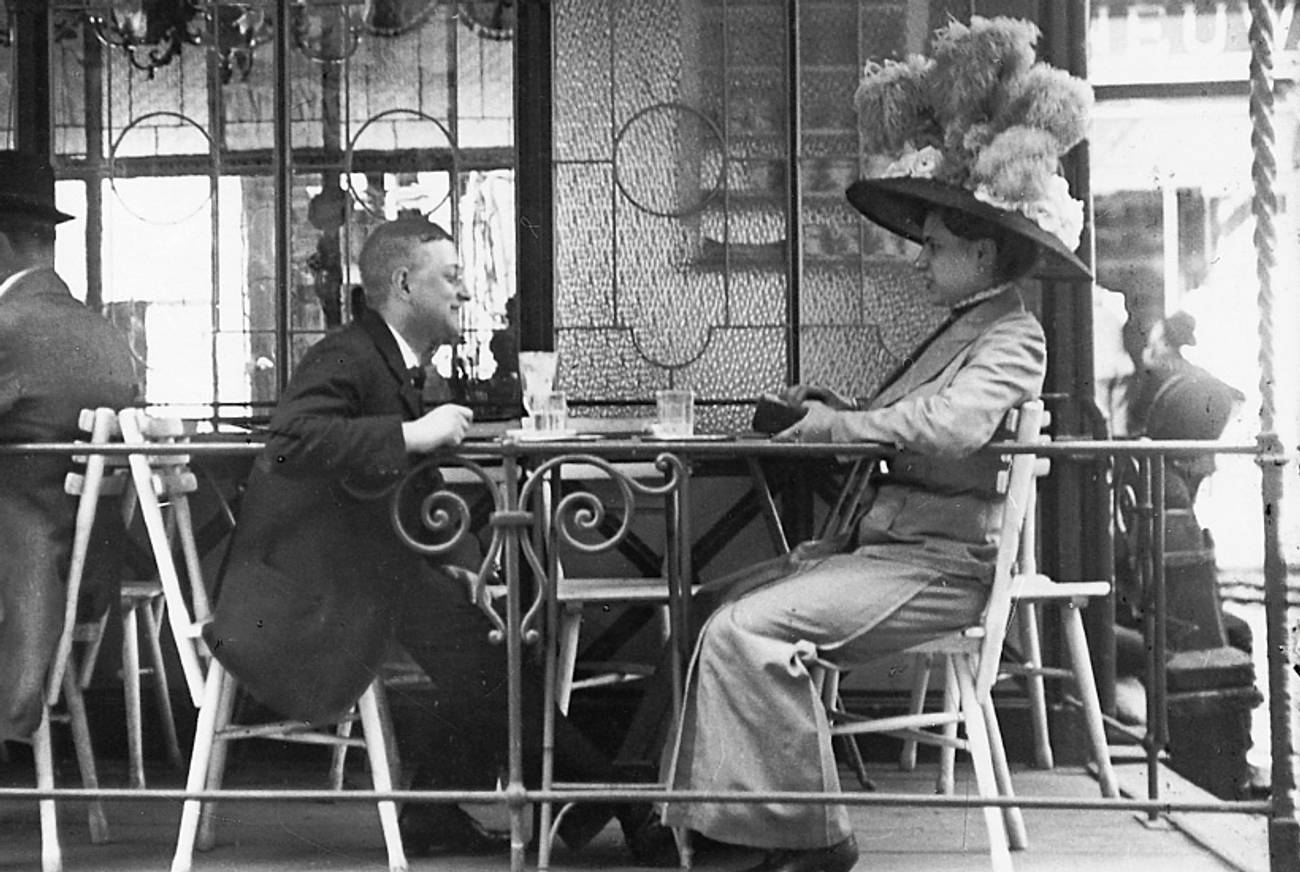Jonathan Franzen’s Love Letter to the Doyen of Jewish Intellectual Vienna
The anointed king of American letters’ eccentric new book, ‘The Kraus Project,’ is also hate mail for our shallow culture




Vienna in the early 20th century was one of the birthplaces of modernity. In those dizzying years, Freud was analyzing his patients’ psyches and Wittgenstein was analyzing the nature of language, Mahler was premiering his ironic symphonies and Schoenberg was experimenting with music beyond harmony. Established truths about human nature, art, and society were collapsing on every side, ushering in the radical uncertainty that would define 20th-century culture.
It is no coincidence that many of these intellectual pioneers, including the four named above, were Jews. The Jewish population of Vienna swelled during the 19th century, as Eastern European Jews brought under the control of the Austro-Hungarian Empire moved to its capital in search of opportunity. This demographic shift made Vienna a Jewish city and a highly anti-Semitic one—anti-Semitic politicians scored some of their biggest early successes in Vienna, and the young Adolf Hitler was profoundly influenced by his time there. But at the same time that they were shut out of political power and subject to discrimination and abuse, the Jews of Vienna commanded the heights of Austrian culture. Their modernism went hand in hand with their ambiguous social status: They were able to see through the conventions of a society that was never quite their own and to invent possible new futures.
For all its variety, Vienna’s Jewish intelligentsia had one thing in common: They all read Karl Kraus. In his autobiography, Elias Canetti describes how he moved to Vienna as a young man and was immediately told that he had to start reading Kraus’ magazine Die Fackel (“The Torch”) if he wanted to be au courant. Die Fackel was not just edited by Karl Kraus; after a few years, he was its sole contributor, and it became a decades-long virtuoso performance. The best English-language book about Kraus is titled The Anti-Journalist, by Paul Reitter, and Die Fackel can best be considered anti-journalism: journalism that attacked and criticized everyone, including other journalists.
In its pages, Kraus held up for mockery everything he hated about Viennese and Austrian society, which was everything: the government, the military, the law, business, advertising, consumer culture, the theater, literature, and above all, the press. His greatest target was Vienna’s main newspaper, the Neue Freie Presse, which was as authoritative in Austria then as the New York Times is in America today. To Kraus, however, the paper was both linguistically and politically corrupt, and he never tired of pointing out everything from clichéd language to actual cases of influence-peddling. In response, the editor of the Neue Freie Presse made a rule that Kraus’ name was never to be mentioned in its columns.
Kraus was such an influential figure, in such an influential time and place, that his name has come down to us through many channels. Canetti writes about him, as do Walter Benjamin and Gershom Scholem; he figures in a small way in the life of Freud, whom he predictably despised. But the actual substance of Kraus’ work remains curiously ghostly in the English-speaking world. While the whole run of Die Fackel is available online in the original German, only small selections have been translated. And even those are hard to appreciate, because of the intensely topical and critical nature of Kraus’ writing. His work took the form of commentary on local figures, passing scandals, the latest books and newspapers—none of which have even the slightest resonance for a 21st-century American reader. That Kraus exercised an enormous moral and literary authority is beyond doubt, but it’s impossible for us to really feel that authority; we have to take it largely on trust.
That situation is not changed by the appearance of The Kraus Project, the admirable and deeply eccentric new book by Jonathan Franzen. Even describing The Kraus Project is a little tricky, much less reading it. At its heart, this is a bilingual edition of five pieces of writing by Karl Kraus, translated into English by Franzen. There are two major essays, dealing with the poet Heinrich Heine and the playwright Johann Nestroy; two short pieces that are sequels to the Heine essay; and a brief poem, written in 1934 near the end of Kraus’ life.
These are complemented by two extensive series of footnotes, which often crowd out the main text for pages at a time. One set of footnotes, by Paul Reitter (whose name really ought to be on the cover of the book), is historical and literary, filling in Kraus’ cultural context and his rapid-fire allusions to all kinds of people and books. The second set is by Franzen himself, and it functions as a platform for his bilious observations about contemporary American culture and for his cutting and hilarious reminiscences about his own youthful ambitions as a writer.
In theory, that makes two reasons why people might want to read The Kraus Project: Fans of Kraus (if such exist) get the essays, while fans of Franzen get the footnotes. In practice, however, the book pulls in so many different directions that it is hard to get a handle on it. The main obstacle, as always, is the difficulty of Kraus’ own writing. Franzen has chosen his texts thoughtfully: “Heine and the Consequences,” written in 1910, and “Nestroy and Posterity,” from 1912, are two of Kraus’ most important essays, and they open up some of the central themes of his work. Even so, the texts are so dense and aphoristic, and the subjects so remote, that I suspect few readers will reach the end of them. (More than once, Franzen’s own footnotes confess to his failure to understand exactly what a Kraus sentence is trying to say.)
Still, these essays are worth struggling with, not least for the light they shed on the dilemmas of German Jewish culture in one of its most glorious phases. Thanks mainly to Reitter’s footnotes, it becomes clear that “Heine and the Consequences,” in particular, was a contribution to a running debate over the proper role of Jews in German literature. Heine, of course, was the great German Jewish poet, the one whose lyrics, set to music by Schumann and others, were known to every schoolchild. This made him a lightning-rod for criticism by those who saw any Jewish contribution to German letters as polluting (including the notoriously anti-Semitic Richard Wagner).
In his essay, Kraus does something he would do many times during his career as a controversialist: He endorses an anti-Semitic argument without explicitly endorsing anti-Semitism. A Jew writing for a largely Jewish readership, Kraus laments the influence of the Jewish Heine on the mainly Jewish journalists who staffed the prestige newspapers of Vienna. Heine, he writes, following an old anti-Semitic trope, was a shallow litterateur who could never plumb the depths of the German language. As a prose writer, he is responsible for creating the feuilleton—the impressionistic newspaper essay at which Viennese journalists excelled (including Theodor Herzl, who before he founded Zionism was a star writer for the Neue Freie Presse). The feuilleton, for Kraus, was a cheap substitute for actual literature: “Writing feuilletons means twining curls on a bald head; but these curls please the public better than a lion’s mane of thoughts. Esprit and charm, which presumably were necessary in developing the trick and becoming adept at it, are now passed on by it automatically. With an easy hand, Heine pushed open the door to this dreadful development.”
In this way, by crooked paths, Kraus argues that the debasement of German literature, its addiction to sensationalism and sentimentality, can be laid at Heine’s door. Whether this is fair to Heine is beside the point. Kraus’ whole life was dedicated to attacking what he saw as the shallowness of Viennese culture, and since so many of the sponsors and creators of that culture were Jewish, he inevitably ended up sounding like half an anti-Semite. (That he was besotted by the aristocracy and eventually converted to Catholicism only increases the impression.) Reitter’s notes sensitively convey the many nuances of this situation, arguing that what really infuriated Kraus was the failure of his fellow German Jewish writers to do enough with their privileged position.
Where does Franzen belong in all this? For him, Kraus seems to serve two symbolic purposes. First, he represents the freedom of all-out attack, of omnicritical satire, which liberates Franzen to lambaste the shallowness and frivolity of our own culture. Many of his complaints have already been widely discussed on the Internet and Twitter—which is ironic, since two of the things Franzen hates most are the Internet and Twitter. When Kraus writes, “In cultures where every blockhead has individuality, individuality becomes a thing for blockheads,” Franzen cheers him on: “You’re not allowed to say things like this in America nowadays, no matter how much the billion (or is it two billion now?) ‘individualized’ Facebook pages may make you want to say them.”
Ironically, however, Franzen’s criticisms of shallowness falter because they are themselves made in a shallow way. Partly out of modesty, partly in deference to democratic etiquette, Franzen ends up casting his objections to Internet discourse as a merely personal matter, a question of taste. “If I’d been born in 1159, when the world was steadier, I might well have felt, at fifty-three, that the next generation would share my values and appreciate the same things I appreciated; no apocalypse pending. But I was born in 1959, when TV was something you watched only during prime time and on weekends, and people wrote letters and put them in the mail, and every magazine and newspaper had a robust Books section,” and so on and so forth. This comes across as merely generational nostalgia, when in fact the values Franzen is trying to champion deserve a more serious and abstract defense. Whatever you can say about Kraus, he never whined.
What’s best about The Kraus Project is the other kind of Franzen footnote, in which commentary on Kraus gives way to full-blown memoir. Franzen first read Kraus in the early 1980s, when he was a Fulbright scholar in Germany, and he writes about this period in his life with a kind of amazement at the foolish, ambitious, self-destructive young writer he used to be. Stuck in a long-distance engagement he didn’t really want, grandiosely committed to overthrowing Thomas Pynchon and becoming the greatest American novelist, Franzen wrote at a fanatical pace and ignored much of the outside world.
At one moment, he writes, “I literally went crazy for about fifteen minutes. Tried to pull my face off with my fingers, tried to rip up the bedsheets with my teeth.” He writes about it now with a wary detachment that seems informed by years of therapy. Yet hovering over all these self-recriminations is the biggest joke of all: His grandiose dreams were justified, and all the craziness paid off. He became Jonathan Franzen, the most famous novelist in America, and perhaps the only one with the prestige—or the literary idealism—to get a book like The Kraus Project published.
***
Like this article? Sign up for our Daily Digest to get Tablet Magazine’s new content in your inbox each morning.
Adam Kirsch is a poet and literary critic, whose books include The People and the Books: 18 Classics of Jewish Literature.
Adam Kirsch is a poet and literary critic, whose books include The People and the Books: 18 Classics of Jewish Literature.